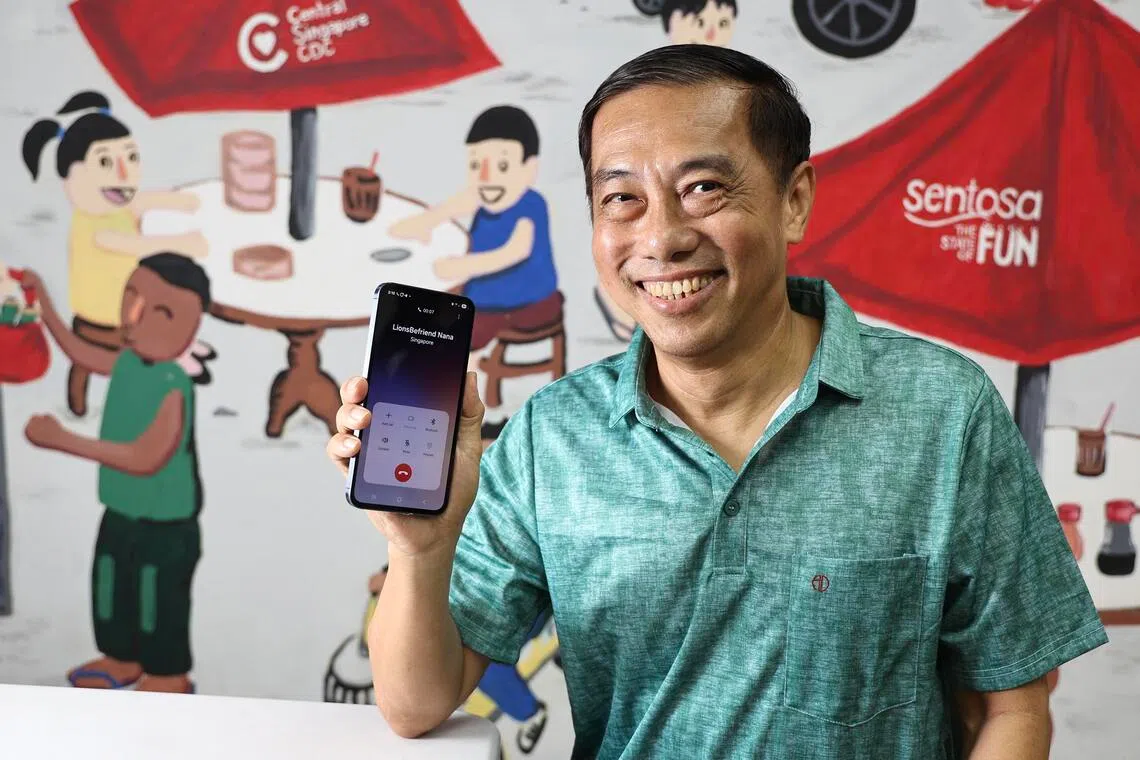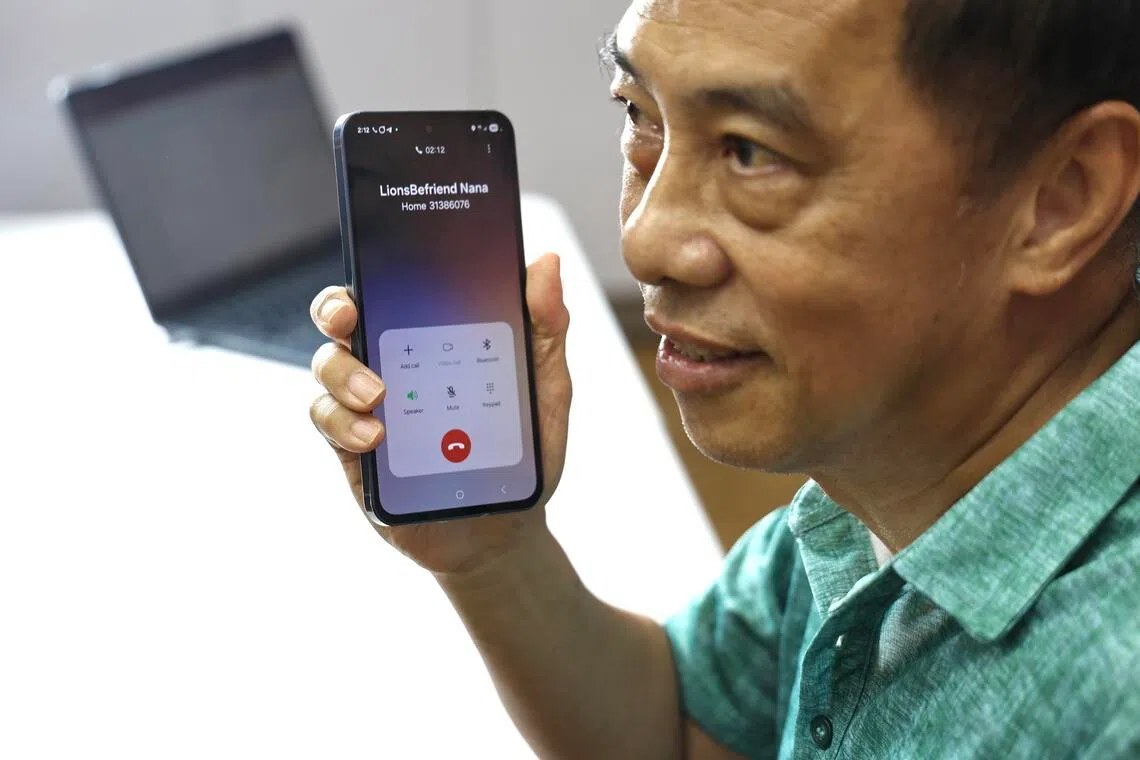‘Excuse me, are you S’porean?’: Lions Befrienders’ upgraded AI agent calls seniors in familiar voice
Sign up now: Get ST's newsletters delivered to your inbox

Mr Tan Hwee Leng, 69, who was among the first 100 seniors to try the voice agent, said the latest version is a “remarkable” improvement from the one he first trialled one year ago.
ST PHOTO: HESTER TAN
Follow topic:
- Lions Befrienders is using an upgraded Singlish-speaking AI voice agent to regularly check in with seniors, automating calls and expanding outreach.
- The AI agent, launching by March 2026, will remind seniors of events and is being trained to detect emotions and understand multiple languages.
- Collaborations with Seasalt.ai and Twilio enable personalised conversations, SMS/WhatsApp interaction, and call transcriptions for better senior care.
AI generated
SINGAPORE – When Mr Tan Hwee Leng recently received an automated check-in call from social service agency Lions Befrienders, the female voice on the other end asked him about his interests, sounding exactly like a Singaporean.
“What’s your interest?”, “When are you available?”, “Are you interested in volunteering?” and “When will you be free?” were some of the questions he was asked when he was invited to try out the upgraded voice agent in early November.
“If I say this week I’m not free, it will say: ‘Okay, I understand. Next week, I will try again’,” said Mr Tan. The 69-year-old retired technical specialist was among the first 100 seniors to try the voice agent in late 2024.
Lions Befrienders’ upgraded artificial intelligence (AI) voice agent impressed Mr Tan with its ability to speak naturally with an authentic Singlish accent.
He said the latest version he tested in early November is a “remarkable” improvement from the one he first trialled one year ago.
“Last November, I could tell it’s a machine. It’s more mechanical and not so responsive,” said Mr Tan.
“When you gave a response, you had to wait for a long time before it responded. But now, it can respond fast. It’s almost instant.”
As Singapore rapidly ages, Lions Befrienders is leveraging voice AI technology to automate regular check-in calls to seniors living alone, making it easier for its staff to provide consistent and timely support.
It plans to officially launch the upgraded voice agent by end-March in 2026 so that it can engage many more seniors despite its limited manpower, said its executive director Karen Wee.
Lions Befrienders’ journey with the voice AI agent started in 2023, when it worked with Seasalt.ai, a Seattle-founded company with a major presence in Taiwan, to create an agent that recognises and understands the specific ways Singaporean seniors communicate.
The social service agency also worked with San Francisco-based cloud communications giant Twilio to link its voice agent with its database of seniors, in order to scale it to handle hundreds of personalised conversations with seniors every day. Ms Wee said Lions Befrienders hopes to scale it further to handle thousands more of these conversations a day in the next few years, up from its current capacity of nearly a thousand.
These automated check-in calls allow Lions Befrienders, which currently supports more than 10,000 seniors and runs 10 active ageing centres (AACs), to expand its outreach and reduce staff burnout.
The voice agent can flag urgent cases where a senior might need more assistance, so that a person can quickly attend to them, said Ms Wee.
For instance, when a senior says he is not feeling well, this will trigger an alert on a dashboard that is manned by Lions Befrienders staff at the AACs, she said.
After all, as Seasalt.ai chief executive Yao Xuchen said in a recent Lions Befrienders release, the voice agent is a conduit for human empathy at scale, helping to augment human connection, not replace it.
The automated system also calls seniors who miss check-ins, and alerts staff if there is no response from the clients.
Lions Befrienders staff and volunteers typically make 15-minute calls to check in on seniors and get them to go down to the AACs or nearby areas to participate in activities. But there is a limit to the number of calls they can make.
“When you use the machine to talk to seniors, and they cannot tell that it’s not a human, that would help to minimise their social isolation. (In the future), this would be especially helpful for seniors with dementia, who may make repeated calls,” said Ms Wee.

The automated system also calls seniors who miss check-ins and alerts staff if there is no response from the clients.
ST PHOTO: HESTER TAN
Plans for the voice agent
Lions Befrienders launched the pilot for the upgraded Singlish-speaking voice assistant in October to 30 seniors, a year after it first trialled the voice agent.
Mr Nur Izzat Mohamad Nashir, an administration and operations executive who is part of Lions Befrienders’ five-member Tech Care team, said: “We are making it sound more natural and going to get more seniors on board.”
The AI agent is thus being trained to understand and speak more languages, including Malay, Tamil and Chinese dialects, starting with Hokkien and Cantonese.
“We are trying to train the AI to understand and talk with the right intonation... It’s not just about the words. It’s (understanding) not just what the seniors say, but also how they say it,” said Ms Wee.
Lions Befrienders is concurrently helping to train a large language model developed by A*Star’s Institute for Infocomm Research called MERaLion
Next is to “go further with voice AI to do emotion detection”, Ms Wee said. “For example, you can’t tell I am lying, but the machine can because it can compare against your past (voice) records.”
Lions Befrienders’ collaboration with Twilio also allows the voice agent to interact with the seniors via SMS or WhatsApp, in addition to voice. By 2026, the seniors will be able to get automated messages to remind them about events they have signed up for, in addition to receiving the voice calls, said Ms Wee.
Having Twilio on board also allows Lions Befrienders to have a transcript of every call made, so that it has a case file for its records, she said.
Lions Befrienders is among Twilio’s more than 2,500 customers in Singapore, spanning diverse sectors including transport, logistics, financial services, high tech, healthcare and retail.
Voice AI is still relatively new, but it is already showing exciting potential, including in healthcare, said Mr Christopher Connolly, director of solutions engineering for Twilio’s communications business in the Asia-Pacific/Japan region.
“We’re seeing healthcare providers exploring voice AI for things like patient engagement, appointment reminders and virtual health assistants,” he said.
“For now, we’re focusing on enabling healthcare organisations to pilot and scale these voice AI solutions. The initial feedback has been encouraging, and because it is scalable, we believe it will play a key role in transforming healthcare experiences in Singapore soon.”
Mr Tan, for one, is excited about the potential. “In the future, I don’t have to go down to the centre to find out what’s happening. I can just tell the voice agent what activities I am interested in, and it can tell me what (event) is on.”


